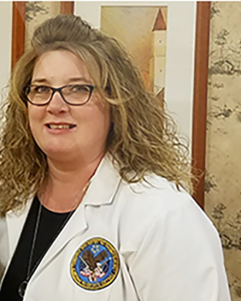
Tammy McCoy, DNP
EAST LIVERPOOL, OH — As VA facilities across the country are transferring veterans’ care wherever possible to telehealth in an attempt to promote social distancing and curtail unnecessary visits to hospitals and clinics, one rural outpatient clinic in Ohio is well ahead of the curve.
Tammy McCoy, DNP, with help from VA’s Geriatric Scholars program, has designed and launched a telephone intervention for veterans with chronic obstructive pulmonary disease in a successful attempt to prevent acute episodes that would otherwise result in a trip to the emergency room.
McCoy, along with her patient-aligned care team in East Liverpool recruited 10 veterans with varying ranges of COPD severity. After making sure each veteran received a flu vaccine, the team contacted patients over the phone each week for six weeks. During that time, no veterans in the program required hospital visits due to COPD exacerbations. This was compared to the same time last year when those same 10 veterans utilized VA emergency services six times over six weeks.
The patients’ clinic visits also dropped by half compared to the previous year and they made 95% fewer calls to the clinic.
Inspiration for the intervention came from McCoy’s participation in VA’s Geriatric Scholars program, which provides professional development to VA healthcare workers who are interested in better integrating geriatrics into primary care practices. Nominated by one of her VA mentors to attend the annual VA Geriatric Scholars conference, McCoy found herself surrounded by peers who were dealing with the same older patient population.
“Geriatric Scholars educates clinicians who work in primary care settings to care for patients who are medically complex,” McCoy explained.
Tasked with coming up with a patient care improvement project, McCoy met with her PACT and decided to target one of the most persistent chronic illnesses seen at her East Liverpool clinic—COPD.
“We looked at the resources available through VA and how veterans were utilizing them,” she said. “We were seeing a lot of acute visits for exacerbation. So we decided to be proactive and get to patients before they get to that acute phase and require emergency intervention.”
COPD can be deeply impacted by a number of factors, including medication adherence, lifestyle choices, and other chronic conditions. By calling veterans, the PACT team is able to better dive into the daily living situations of each veteran.
“These are nurses with good experience who know the patient who are making these calls,” McCoy said. “They know if [the veteran] lives alone or if they’re caring for an elderly spouse.”
During the calls, nurses talk to the veteran about what symptoms they’re experiencing, how they’re utilizing their inhalers and other medications, their diet and exercise, smoking cessation efforts and myriad other details. They also talk with other support people in the home to make sure they’re well-informed about how to best manage the veteran’s COPD.
“It’s financially and emotionally draining for patients to go to the hospital, especially when they are elderly or struggling with chronic illnesses,” McCoy explained. “Before the project, we had six acute care emergency room visits. The following year, we had zero.”
The success of the intervention is due directly to VA’s utilization of the PACT structure, she added. “I have a pharmacist. I have a social worker. I have a strong nursing team. And we’re able to care for these patients as a team. It’s a true interdisciplinary approach.”
That includes incorporating mental healthcare into the intervention.
“Chronic disease is a process. It’s a syndrome,” McCoy noted. “Having that support with mental health can help with smoking cessation and lifestyle changes.”
The PACT model helps foster patient-centered care, which can be key to inspiring veterans to take an interest in their own care.
“It’s about making them feel empowered,” McCoy said. “It’s about making them feel confident, about knowing when they have symptoms brewing and when they have to call the nurse. Knowing which inhalers are for every day use and which [are for acute use]. Knowing that a flu shot will keep them well.”
As expected, COVID-19 has become a regular part of the telephone conversations, though the patients were already well-informed when it comes to the dangers of disease transmission and how that can impact COPD.
“We’ve already had those conversations about handwashing and staying away from crowds, because my COPD population is vulnerable,” McCoy explained.
The intervention’s success has inspired McCoy and her PACT to expand the practice into diabetes and hypertension management. Other PACT teams at East Liverpool have begun using similar measures and McCoy is working with a nurse manager to expand the intervention to the entire VA Northeast Ohio Healthcare System.


